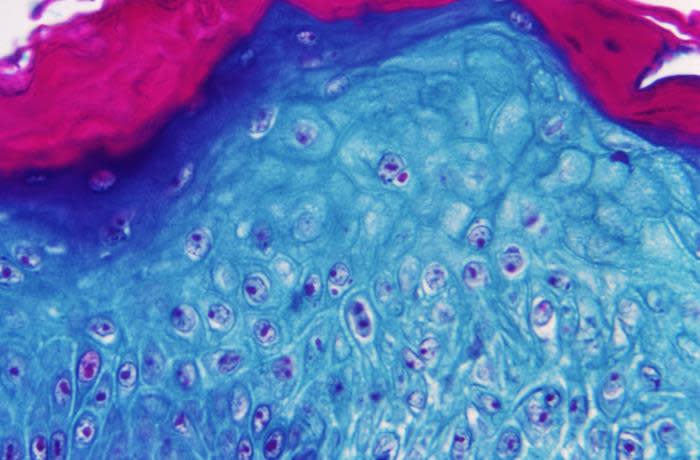Navajo Nation confirms its first case of monkeypox

- Oops!Something went wrong.Please try again later.
Navajo Nation President Jonathan Nez announced on Wednesday that the tribe had confirmed its first case of monkeypox in New Mexico’s McKinley County.
“We continue to take a proactive approach to mitigate Monkeypox here on the Navajo Nation, through the establishment of the Monkeypox Preparedness Team that includes our health care experts and by engaging with federal health officials and the White House,” Nez said in a written statement. “Through these efforts, we’ve been able to secure doses of the Monkeypox vaccines and they will be available to the Navajo people soon.”
During a special town hall meeting that was livestreamed on Facebook Thursday morning, Nez urged people to continue the safety practices employed for COVID-19, such as wearing face masks, social distancing and using hand sanitizer liberally.
Preparedness efforts: Navajo Nation will receive monkeypox vaccine
“We’re so interconnected now more than ever that we do have our first case,” Nez said. “Now we need your help, Navajo people, to continue to follow these protocols and to listen to these presentations of how to take better care of ourselves and our families and our communities.”
Nez stressed the differences between monkeypox and COVID-19, noting that the former doesn't spread through the air but rather through touch.
Capt. Brian Johnson, acting area deputy director for the Navajo Area Indian Health Service, noted that monkeypox is not a new virus and has existed in other parts of the world for years.
“It just so happens that at this point in time there is some transmission happening — not only internationally but nationally within the United States,” Johnson said.
Johnson said monkeypox doesn’t spread easily without close contact with someone who has it and the threat of monkeypox remains low in the United States, but said the Centers for Disease Control and Prevention has advised health care providers to be on the lookout for those with rashes consistent with monkeypox symptoms.
Monkeypox in Arizona: Gay men in Phoenix confront monkeypox threat, warn against stigmas
Johnson said symptoms of monkeypox can take anywhere between five to 21 days to appear after exposure. Symptoms can include a rash that can look like pimples on the face and on or inside the mouth along with other parts of the body. He added that the rash goes through multiple stages before it heals completely. Other symptoms can include fever, muscle aches, exhaustion and chills.
Johnson noted that, unlike what happened initially with COVID-19, effective monkeypox vaccines already exist and are being distributed within the Navajo Nation.
Dr. Laura Hammitt, an infectious disease physician with the Johns Hopkins Center for American Indian Health, echoed Johnson’s points that monkeypox is less contagious than COVID-19 and is a much different virus in many other ways.
Hammitt said most people recover from monkeypox without needing treatment within two to four weeks, though it can get serious — especially for those who are immunocompromised. Hammitt recommended that people wash their hands often with either soap or an alcohol-based hand sanitizer — especially before eating, touching their face or using the bathroom. She also recommended people avoid crowded events involving prolonged skin-to-skin contact.
Hammitt said activities like going to the fair are fine, but attending a rave involving minimal clothing might be a risk. She noted that many monkeypox cases are spread through sexual contact and urged practicing safe sex regardless of sexual orientation or gender identity.
Stretching supply: Monkeypox vaccine protocol may change as case numbers in Arizona continue to climb
Hammitt said monkeypox vaccines can help people with monkeypox cases but only if administered within two weeks of exposure.
Hammitt said the CDC recommends vaccinations for people in the following categories:
Someone identified as a close contact for someone diagnosed with monkeypox.
Someone whose sexual partner within the last two weeks was diagnosed with monkeypox.
Someone with multiple sexual partners in an area with known monkeypox cases.
Anyone experiencing symptoms should consult with their health care provider.
Reach the reporter Perry Vandell at 602-444-2474 or perry.vandell@gannett.com. Follow him on Twitter @PerryVandell.
Support local journalism. Subscribe to azcentral.com today.
This article originally appeared on Arizona Republic: Navajo Nation sees its first case of monkeypox

